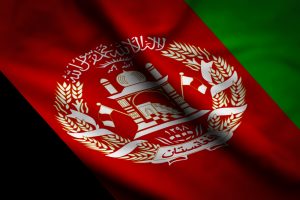On Sunday, August 15, the Taliban were at the gates of the Afghan capital. President Ashraf Ghani, who days earlier had flown to Mazar-i-Sharif to rally Afghan troops, announced his departure from Afghanistan on Facebook. It is, after all, 2021.
He called it a hard choice between facing the Taliban and leaving, but said “the Taliban have won with the judgement of their swords and guns, and are now responsible for the honor, property and self-preservation of their countrymen.” Ghani said he left to “prevent a flood of bloodshed” should the Taliban attack Kabul. He reportedly flew to Tajikistan, but later reports suggest Dushanbe turned him away and he’s in Oman.
Reuters, citing Russian news agency RIA, reported on Monday that Ghani did not leave Kabul empty-handed. A spokesman for the Russian Embassy in Kabul said, “Four cars were full of money, they tried to stuff another part of the money into a helicopter, but not all of it fit. And some of the money was left lying on the tarmac.”
The opulence and corruption of Afghanistan’s leaders, aided and abetted by international powers and donors, has been a long-running complaint in the Afghan political sphere.
Earlier, videos circulated of Taliban fighters sitting in the opulent home of notorious ethnic Uzbek warlord Abdul Rashid Dostum. A large flatscreen TV sits between white and blue vases in a room filled with chandeliers and dozens of plush, golden-gilded couches. Rococo is clear the aesthetic of the room; the vibe is dictator chic, rich.
Jennifer Brick Murtazashvili, of the University of Pittsburgh’s Center for Governance and Markets, points to the Taliban’s sharing of such pictures and videos as “strategic.”
“Their messaging shows that they understand that corruption was the primary driver of [so many grievances among the Afghan public].”
Over the past week, Taliban forces moved — in some cases without a fight — into provincial capitals across the country. Although the Taliban advance not without violence, as the horrors of Spin Boldak attest, it was also marked by surrender.
The Washington Post, reporting that the groundwork for the Taliban blitz was paved with negotiated surrenders, included a comment from a Kabul-based Interior Ministry officer after Kunduz fell:
Soon after, negotiations in the western province of Herat yielded the resignation of the governor, top Interior Ministry and intelligence officials and hundreds of troops. The deal was concluded in a single night.
“I was so ashamed,” said a Kabul-based Interior Ministry officer, referring to the surrender of senior ministry official Abdul Rahman Rahman in Herat. “I’m just a small person, I’m not that big. If he does that, what should I do?”
“They chose not to fight and that is for political reasons,” Murtazashvili says, highlighting reports of Afghan forces going unpaid and lacking supplies as basic as ammunition. “They lost trust in their political leaders,” Murtazashvili continues. After facing the question of whether Ghani’s Afghan government was worth fighting for, the answer for many Afghans was “no.”
“Why? Because of corruption, because of deep alienation, because people weren’t getting paid on the frontlines. You have these rural outposts which were isolated and didn’t have ammunition. Why are they going to fight for these people sitting in these palaces? For Ashraf Ghani, who is running out of the country with bags of millions of dollars?”
The Taliban, meanwhile, have reportedly begun patrolling Kabul, managing traffic and guarding key buildings. Some reports suggest they’ve set up a task force to deal with complaints about looters. The Taliban announced a general amnesty in days before taking Kabul. And although there has been considerable chaos at the airport as many Afghans try to flee, the Taliban has reportedly met with U.S. officials and agreed to not interfere with evacuations. Kabul has not seen widespread violence so far.
All this may change, and change rapidly, but all the same corruption is threaded throughout the Afghan tragedy.













